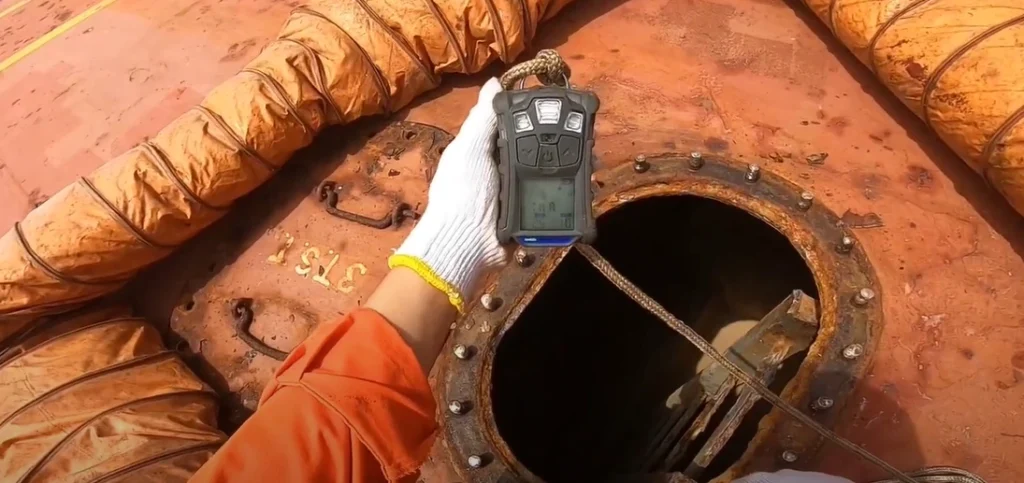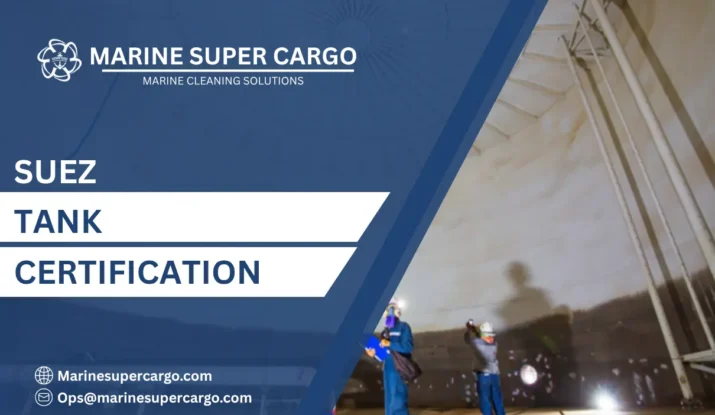Understanding Tank Certification Requirements at Suez
Securing proper tank cleanliness certificates represents a critical operational requirement for vessels transiting through Suez Port. The Suez tank certification process verifies that cargo tanks meet stringent cleanliness standards before loading new cargo or departing Egyptian waters. At Marine Super Cargo, we guide vessel operators through every stage of this essential compliance procedure.
The Suez tank certification system protects cargo quality, prevents cross-contamination, and ensures environmental compliance. Independent surveyors appointed by the Suez Port Authority conduct thorough inspections using internationally recognized standards. These inspections examine tank surfaces, heating coils, pipework, and associated equipment to verify cleanliness levels.
MARPOL and IMO Standards for Tank Certification
MARPOL Annex II establishes international standards for chemical cargo tank cleaning and certification. The Suez tank certification process incorporates these requirements, ensuring vessels comply with global pollution prevention protocols. Surveyors verify that tank cleaning operations meet MARPOL discharge criteria before issuing certificates.
The IMO publishes comprehensive guidelines for tank cleaning procedures through various circulars and codes. The International Bulk Chemical Code (IBC Code) specifies cleaning standards for chemical tankers seeking certification. Suez tank certification inspectors reference these documents when evaluating tank conditions and determining compliance.
Tank cleaning for certification purposes must remove all previous cargo residues, washing solutions, and contaminants. The degree of cleanliness required varies based on the next cargo’s specifications. Some high-purity cargoes demand “hospital clean” standards, while others accept “water white” or “gas free” conditions.
Documentation forms an integral component of the Suez tank certification process. Vessels must present their Cargo Record Book, tank cleaning logs, and previous cargo details to surveyors. This paperwork demonstrates cleaning methodology, duration, and materials used during preparation operations.


Pre-Inspection Preparation Procedures
Successful Suez tank certification begins with thorough pre-inspection preparation. Vessel crews should complete all required cleaning operations before scheduling surveyor attendance. This preparation includes multiple washing cycles, proper ventilation, and adequate drying time for tank surfaces.
Tank cleaning methodology depends on previous cargo characteristics and next cargo requirements. Hot water washing suffices for many petroleum products, while chemical cargoes may require specialized solvents or detergents. Marine Super Cargo provides expert guidance on selecting appropriate cleaning agents that comply with environmental regulations and achieve required cleanliness levels.
Gas-freeing represents a critical preparatory step before Suez tank certification inspections. Surveyors will not enter tanks containing hazardous atmospheres or insufficient oxygen levels. Portable gas detection equipment must confirm safe entry conditions before inspection commencement.
Lighting arrangements facilitate thorough visual examination during Suez tank certification surveys. Adequate illumination throughout the tank—from the weather deck to bilges—enables surveyors to identify residual contamination on bulkheads, frames, and bottom plating. Portable lighting may supplement fixed tank lighting systems.
The Inspection and Certification Sequence
Suez tank certification inspections follow systematic procedures established by the Suez Port Authority. Surveyors first review vessel documentation, confirming cargo history and cleaning operations performed. They then conduct visual examinations of tank interiors, examining all surfaces for residues, rust scale, coating damage, or other defects.
Sample collection may occur during Suez tank certification surveys for certain cargo transitions. Surveyors collect water rinse samples from tank bottoms and analyze them for contamination. Laboratory results determine whether additional cleaning is necessary before certificate issuance.
Inspection findings are documented in detailed survey reports describing tank conditions, identified deficiencies, and recommended corrective actions. If tanks meet required standards, surveyors issue Tank Cleanliness Certificates specifying the cleanliness grade achieved and suitable subsequent cargoes.
Failed inspections require additional cleaning and re-inspection. Vessel operators must address all deficiencies identified in survey reports before requesting re-examination. This process may involve additional washing cycles, rust removal, or coating repairs depending on specific findings.
Certificate Types and Validity Periods
The Suez Port Authority recognizes several Suez tank certification grades reflecting different cleanliness levels. “Cargo Free” certificates indicate removal of all cargo residues but may show slight staining. “Water White” certificates demonstrate higher cleanliness with no visible residues or discoloration.
“Hospital Clean” represents the highest Suez tank certification standard, required for food-grade cargoes and certain high-purity chemicals. Achieving this grade demands meticulous cleaning, often including multiple hot water washes followed by freshwater rinses and complete drying.
Certificate validity periods vary based on tank conditions and environmental factors. Most certificates remain valid for 24-72 hours after issuance, assuming tanks remain sealed and protected from contamination. Extended validity may be granted under specific circumstances with proper tank preservation.
For comprehensive information on maintaining tank cleanliness standards, explore our resources on chemical tank cleaning protocols and cargo tank maintenance best practices.
Cost Considerations and Time Management
Suez tank certification costs include surveyor fees, laboratory analysis charges, and potential re-inspection expenses. These costs vary depending on vessel size, number of tanks requiring certification, and complexity of inspections performed. Obtaining advance quotations helps operators budget appropriately.
Scheduling flexibility optimizes time management during the Suez tank certification process. Coordinating surveyor availability with vessel arrival times prevents unnecessary waiting periods. Marine Super Cargo facilitates these arrangements, ensuring efficient certification completion that aligns with operational schedules.
Frequently Asked Questions
Q1: How long does the Suez tank certification inspection process typically take?
Inspection duration depends on vessel size and tank quantity, typically ranging from 2-8 hours. Single tank inspections may complete within 1-2 hours, while full vessel surveys require longer periods for thorough examination.
Q2: Can vessels obtain tank certification while anchored in Suez Bay?
Yes. Surveyors conduct inspections at anchorage, berth, or during canal transit depending on scheduling requirements and operational circumstances. Advance arrangements ensure surveyor availability at desired locations.
Q3: What happens if tanks fail the initial certification inspection?
Vessels must perform additional cleaning addressing identified deficiencies, then request re-inspection. Surveyors return to verify corrective actions were effective before issuing certificates. Re-inspection fees apply.
Q4: Are there specific cleaning agents prohibited during tank preparation for Suez certification?
Cleaning agents must comply with MARPOL environmental standards and not leave harmful residues. Surveyors may reject certificates if prohibited substances were used during cleaning operations.
Q5: How many tanks can be certified in a single inspection visit?
Surveyors can inspect multiple tanks during one visit, with no specific limitations. However, all tanks must be properly prepared, gas-free, and accessible before inspection commencement.
For professional assistance with Suez tank certification and comprehensive cleaning services, contact Marine Super Cargo today.


